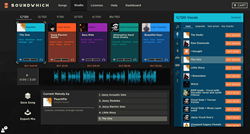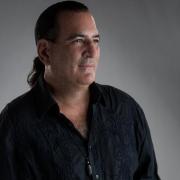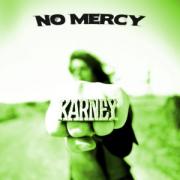New York, NY (Top40 Charts) By converting the formulas of pop songwriting into algorithms, Soundwhich makes it easy for anyone to create exciting new songs in a matter of seconds.
With Soundwhich, anyone can combine these ingredients in any way they like to create a fully-realized piece of music, just like using meat, veggies and condiments to make a sandwich.
Music is math that moves people. That's the conceit behind Soundwhich, an online platform that allows users to access, combine and share the basic "ingredients" of music to create their own songs, all without preexisting musical knowledge.
"It's well-known that musicians use widely-accepted formulas to compose the bulk of the music we hear every day," says Soundwhich tech lead
Roger Chen of San Francisco-based Varidada Inc. These formulas specify tempo, chords and song structure. This is the minimum information a musician needs to know to compose an "ingredient" such as a bass line or a vocal harmonic that can be mixed with musical elements by other musicians using the same formula.
Soundwhich's innovation is to transform these formulas into algorithms called "musical guidelines." Using these common guidelines, musicians can create "ingredients" (divided into melody, harmony, bass and drums) that can be combined in nearly infinite variations. Soundwhich collaborated with hundreds of vocalists, guitarists, pianists, drummers and electronic producers around the world to source these ingredients.
"When you talk about sampling, whether that's digging in the crates at the record store or using a program to remix digital files, you're talking about composition as assemblage," says Chen. "The existing elements have their own meaning and context, but it's the distinctive way you put them together that makes the song new. We're trying to make that process more accessible to those with no previous musical knowledge. With Soundwhich, anyone can combine these ingredients in any way they like to create a fully-realized piece of music, just like using meat, veggies and condiments to make a sandwich."
Using the platform to create songs is simple and intuitive. Once a user has selected their formula, they can search for ingredients by category and tag, adding and dropping elements from the mix in real time. Stick to ingredients within a single "genre" to snap together a jazzy instrumental, or wander further afield to create a heretofore-unknown fusion of house, latin and metal. Without human intervention, Soundwhich has produced over 150 billion songs by using every possible combination of the samples in its database—but the one thing software can't yet do is immediately recognize when it's scored a hit like a human can.
Users are able to purchase their best creations directly from Soundwhich under royalty free music terms.
Custom music from Soundwhich can be used to soundtrack films, corporate videos, podcasts, games and advertisements.





















